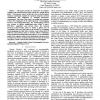Free Online Productivity Tools
i2Speak
i2Symbol
i2OCR
iTex2Img
iWeb2Print
iWeb2Shot
i2Type
iPdf2Split
iPdf2Merge
i2Bopomofo
i2Arabic
i2Style
i2Image
i2PDF
iLatex2Rtf
Sci2ools
126
click to vote
ICC
2007
IEEE
2007
IEEE
Global Control Plane Architecture for Cognitive Radio Networks
— This paper presents an architecture for adaptive cognitive radio networks based on the concept of a “global control plane”. The proposed control architecture uses a predetermined common coordination channel for spectrum etiquette, network establishment and adaptation to changing interference environments. The focus of this work is on design and evaluation of three key components of the control protocol - bootstrapping, discovery and naming/addressing. The bootstrapping protocol uses beacons to inform neighboring nodes about a node’s PHY/MAC capabilities and current status. The network discovery protocol helps nodes to obtain a global view of reachability and end-to-end paths in the network by exchanging and propagating local link states. Further, nodes obtain their IP addresses and perform name to network address translations using a distributed naming/addressing scheme. An ns2 simulation model of the cognitive radio network with global control has been developed and used to ...
Related Content
| Added | 02 Jun 2010 |
| Updated | 02 Jun 2010 |
| Type | Conference |
| Year | 2007 |
| Where | ICC |
| Authors | Xiangpeng Jing, Dipankar Raychaudhuri |
Comments (0)

